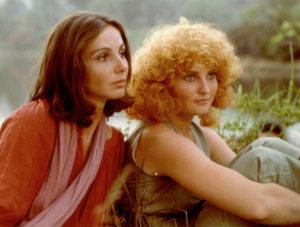STUDIO: Criterion | DIRECTOR: Agnès Varda | CAST: Thérèse Liotard, Valérie Mairesse, Robert Dadiès, Mona Mairesse, Francis Lemaire, François Courbin
RELEASE DATE: 5/28/19 | PRICE: DVD $20.67, Blu-ray $27.37
BONUSES: Facsimile of the original press kit; essay by critic Amy Taubin; Varda shorts “Reponse de femmes” and “Plaisir d’amour en Iran”; 1977 documentary about the film’s making
SPECS: NR | 121 min. | Foreign language drama | 1.66:1 widescreen | monoRATINGS (out of 5 dishes): RATINGS (out of 5 dishes): Movie
| Audio
| Video
| Overall
One of the most striking things about the work of the recently departed French New Wave filmmaker Agnès Varda is how unalike her fiction films are. Varda worked steadily as a photographer over the decades, and so only made films when she wanted to, moving from topic to topic (and genre to genre) over her 65-year career.
The 1977 feature One Sings, the Other Doesn’t was her sole fiction film in the 1970s, and it very much reflects the period. It examines women’s life choices through the vehicle of a friendship between — naturally enough, given the title — Pauline, a singer (Valérie Mairesse), and Suzanne (Thérèse Liotard), a woman running a family planning clinic.
The film is one of Varda’s longest, clocking at two hours, and it covers a lot of territory. Pauline is an independent spirit who rejects her parents’ mentality, traveling from place to place and moving from relationship to relationship. Suzanne is a “rooted” sort who endures her parents’ slings and arrows after having two children at a young age with a suicidal photographer (one of the film’s most curious, and grim, plot strands). She forges her own identity as an adult by making careful choices and devoting herself to helping pregnant girls and women.
Varda never made a bad film, but One Sings works better as a fascinating time capsule than it does as a drama. The friendship between the women — “a bridge in the air” comprised of updates in postcards (which move the film backwards and forwards in time) — doesn’t resonate as it might have if the women had actually encountered each other more often. As it stands, there are very long stretches of the film where the two never meet in person.
This “epistolary” aspect isn’t helped by the fact that less time is spent on Suzanne’s story — which contains many relatable elements — than Pauline’s, which contains more “exotic” elements, including her tours with a women’s folk group and moving to Iran with a demanding boyfriend.
 The most disappointing aspect of the picture is that Pauline’s songs, which punctuate the action, are not very good. Composed by various musicians, including the real-life group seen in the film, the songs have lyrics by Varda herself. The resulting ditties are somewhat corny artifacts of the era. (Sample lyric: “Friedrich Engels once did say/that in the families of today/The man is the bourgeoisie/And woman is the proletariat….”)
The most disappointing aspect of the picture is that Pauline’s songs, which punctuate the action, are not very good. Composed by various musicians, including the real-life group seen in the film, the songs have lyrics by Varda herself. The resulting ditties are somewhat corny artifacts of the era. (Sample lyric: “Friedrich Engels once did say/that in the families of today/The man is the bourgeoisie/And woman is the proletariat….”)
The supplements included in the release offer interesting context for the film. A 1976 short called “Plasir d’amour en Iran” consists of a segment that Varda clearly thought would unnecessarily lengthen Pauline’s trip to Iran. Thus, we see Pauline and her Iranian boyfriend as they tour Iranian mosques, and they wind up visually “lost” within the splendors of the mosque walls.
“Reponse de femmes” (1975) is a short made for TV in which Varda answers the question “What does it mean to be a woman?” by showing a group of women and girls talking about their lives, from self-image and sexuality to motherhood and aging.
Varda can be seen at work in Women Are Naturally Creative: Agnès Varda, Katja Raganelli’s 1977 documentary. As she shoots the epilogue of One Sings, Varda notes to Raganelli that she doesn’t like making shot lists and instead works on instinct — during the shoot we see her guiding the cameraman to close in on a stray detail or to include an item that was formerly out of frame.
She laments the “terrible decline” of the French film industry into another “star system” with big budget features receiving the lion’s share of attention. In the most interesting moments, she discusses how she self-funded One Sings with money from various sources.
The package contains a nifty extra — a facsimile of the original press book for the film, translated into English. The booklet contains a number of writings by Varda. The best one ends with a declaration that could serve as her epitaph: “To make movies is to rediscover your adolescence. It is to rediscover (without shame) the feelings of an age without certainties. It is to run toward joy.”
|
Buy or Rent One Sings, the Other Doesn’t
|
|---|
Leave a Reply